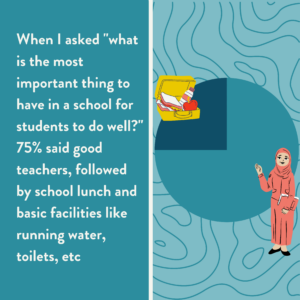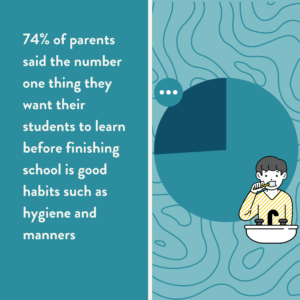Drawing on her experiences interning with Possip, Emory University graduate and former Possip Intern, Isha Soni, leveraged her learning from Possip to gather a unique perspective on education in rural communities outside of the United States.
A Possip Intern’s Perspective on Education in Rural Nepal
I spent eight months of the last year living in one of the most rural villages in Nepal. This village’s closest road was a two-hour hike away. It had very little infrastructure and two small government schools for students up to tenth grade. I went there to conduct research on these schools which would ultimately help school leaders and local government officials make informed, evidence-based decisions about school budgets and policies. In a community of primarily subsistence farmers, I wanted to know what people thought the purpose of formal education was when there were very few jobs outside of farming for their own families.
Going in, I knew that teacher and student absenteeism were the main problems that the schools were facing. Before this experience, I was an intern and reporter at Possip for several years and saw first-hand the impact that including and emphasizing parent and staff voices could have in a school system. Immediately I knew, because of my experience at Possip, that I wanted to create two separate surveys for parents and staff to get a better sense of why these issues were so prevalent in this community. I suspected that caste issues, agricultural work, and the cultural mindset de-emphasizing the importance of formal education in the community were the primary reasons most students and teachers were often absent from school.
The purpose of creating a survey was to get a sense of what parents and families wanted out of their school system.
Survey included questions about:
- What they wanted their children to learn before tenth grade (the year most people in the community do not continue further schooling).
- What the purpose of education was for their family.
- What acceptable reasons for missing school were.
- Where they wanted their children to be after school.
- Whether families are generally satisfied with their child’s school (the classic Possip question). 😉
The Results:
- Most surveyed parents had little to no education but felt school was important for their children.
- Parents wanted their children to stay in the rural district instead of leaving for higher-paying jobs.
- Just over half of the families were satisfied with the school itself.
- The majority of families wanted their children to learn good hygiene, manners, and practical day-to-day knowledge.
- Fewer families expected their children to learn math and science by tenth grade compared to those who expected their children to learn good personality skills by that time.
Some of the results of my survey reminded me of the feedback I read as a reporter analyzing parent comments for Possip’s partner schools during the peak of the pandemic. When schools were forced to turn to online learning, American parents similarly seemed to be less concerned about academic gaps and more concerned about their children missing socialization and the ability to learn from their peers in school.
_______________________________________________________





